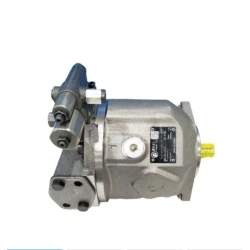Features and applications of reciprocating piston pumps
2023-11-24
Reciprocating piston pumps are a type of positive displacement pump that use one or more pistons moving back and forth within cylinders to create pressure and move fluid. These pumps are known for their ability to generate high pressures, making them suitable for various applications where a consistent and controlled flow of fluid at elevated pressure levels is required. Here are key features and applications of reciprocating piston pumps:
Key Features:
1. Reciprocating Motion:
- Pistons: Reciprocating piston pumps use one or more pistons that move back and forth within cylinders to create a pumping action.
- Crankshaft Mechanism: The reciprocating motion is often achieved through a crankshaft mechanism, converting rotary motion into linear motion.
2. Positive Displacement:
- Displacement: These pumps are positive displacement pumps, meaning they move a fixed volume of fluid with each stroke, ensuring a consistent and precise flow.
3. High Pressure:
- Applications: Known for their ability to generate high pressures, reciprocating piston pumps are used in applications such as high-pressure cleaning, waterjet cutting, hydraulic systems, and industrial processes requiring intense pressure.
4. Multiple Cylinders:
- Single vs. Multiple Cylinders: Reciprocating piston pumps may have a single cylinder or multiple cylinders working in parallel, which can enhance efficiency and reduce pulsations in the fluid flow.
5. Valves:
- Check Valves: Piston pumps often use check valves to control the direction of fluid flow, ensuring that fluid moves in one direction only.
6. Variability in Stroke Length:
- Adjustable Stroke Length: Some reciprocating piston pumps allow for the adjustment of the stroke length, providing flexibility in controlling the volume of fluid moved per stroke.
7. Versatility:
- Fluid Compatibility: Depending on materials used in construction, reciprocating piston pumps can handle a wide range of fluids, including corrosive or abrasive substances.
Applications:
1. High-Pressure Cleaning:
- Industrial Cleaning: Reciprocating piston pumps are commonly used in high-pressure cleaning systems for industrial equipment, surfaces, and vehicles.
2. Waterjet Cutting:
- Precision Cutting: In waterjet cutting machines, reciprocating piston pumps create the high-pressure water needed for precision cutting of materials.
3. Hydraulic Systems:
- Power Transmission: Reciprocating piston pumps are integral components of hydraulic systems, providing the force needed for various mechanical operations.
4. Oil and Gas Industry:
- Well Stimulation: In the oil and gas industry, reciprocating piston pumps are used for well stimulation processes, such as hydraulic fracturing.
5. Industrial Processes:
- Chemical Processing: These pumps are employed in chemical and industrial processes where precise control of fluid flow and pressure is critical.
6. Testing Equipment:
- Pressure Testing: Reciprocating piston pumps are used in testing equipment where high-pressure conditions need to be simulated for quality assurance purposes.
7. Water Supply:
- Boiler Feed: In power plants, reciprocating piston pumps are used for boiler feed applications, ensuring a reliable and consistent water supply at high pressures.
8. Automotive Testing:
- Engine Testing: Used in automotive testing facilities for testing engines and components under various pressure conditions.
Reciprocating piston pumps offer a robust and reliable solution for applications requiring high-pressure fluid movement. Their positive displacement nature and ability to handle varying viscosities make them versatile in meeting the demands of diverse industries.



